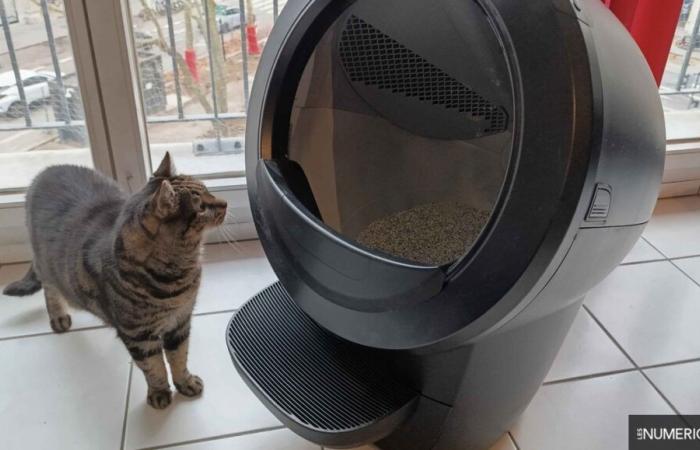Many everyday objects are connected today, but some still have a place to be made: self-cleaning litter boxes. However, these products are often very expensive, take up space and do not always have an excellent reputation. Taking the plunge can therefore seem complicated. It is in this context that we are testing here the latest generation of connected litter from Whisker, the Litter-Robot 4.
Installation and configuration, specifics, maintenance and cleaning, advantages and disadvantages compared to a classic tank, and above all the daily impact on humans and animals: this test is here to put an end to the prejudices surrounding these tech accessories (or not). . Especially since the one that interests us today costs a whopping €900.
Guybrush and Frix, our extreme testers.
© Les Numériques
Ergonomics
Unsurprisingly, the Litter-Robot 4 cannot be installed anywhere in your home. A little larger than a classic bin (56 cm wide by 69 cm deep and 75 cm high), the device also requires access to a power outlet. Be careful to order the version with a European plug, as the manufacturer initially sent us the wrong one. This litter box chooses to place the waste drawer under the box, and not on the side as is often the case.
Litter and mat (optional).
© Les Numériques
This decision saves a little space in width by forgetting kittens or cats who are a little lazy (pleonasm) who do not like to climb: the entrance to the box is indeed a little high. However, a step is there to help, while the entrance to this round solution is very wide to accommodate even the largest cats. A removable plastic piece can be added or removed at the bottom of the entrance to prevent cats from putting litter outside, but this is a potential additional obstacle to their entry.
The inside of the bin.
© Les Numériques
At the bottom of the rotating orb, a soft plastic surface accommodates the litter and a line lets you know how far to fill it. Above, a sieve separates litter and waste when the bin rotates on its axis. We would have appreciated being able to change this sieve for a larger or coarser mesh solution, in order to use a wider variety of litter. In fact, you will have to use very small clumping grains, otherwise you risk seeing the Litter-Robot 4 throw away a large quantity of clean litter. Once the right litter is found, everything is sorted perfectly and quickly, and it only takes a few days of use to judge that, yes, this solution should save time and money in the long term.
Lots of litter rejection if it is too big.
© Les Numériques
Raising the cover on top of the tank provides access to the exterior of the orb. On it, there is a place to slide a carbon filter above the waste drawer to avoid odors. This consumable having a fairly specific semi-circular shape, it is unfortunately difficult to replace it with any filter, unless you use scissors. Below the orb is the junk drawer. Easy to remove and replace using the step which acts as a handle, it can accommodate any type of garbage bag. A good point.
The system for fixing the carbon filter.
© Les Numériques
Finally, on the top of the Litter-Robot 4 there are several buttons (scale reset, empty, cycle, network connection and power off/on) and an illuminated panel to indicate various information (wifi connection, waste bin full, countdown started before cleaning, etc.). Note also the presence of a light inside the tank, which can be activated automatically via an ambient light detector.
A clear and practical button and lighting system.
© Les Numériques
Everything is made of decent quality plastic (you will have to wait a certain amount of time to see how the whole thing ages) and the Litter-Robot 4 is available in white or black.
With or without this front cover, it's your choice.
© Les Numériques
Whisker offers some optional accessories to enrich its experience. We were able to test the majority of them.
The litter box with the staircase accessory.
© Les Numériques
This involves a traditional carpet (effective, but which significantly increases the space taken up by the whole), a pack of anti-odor balls to replace the integrated carbon filter, a staircase which can help some cats to better access the litter, a tank which can automatically add litter to the box (not tested) and a “shield”, a part to be added in the frame of the box to close it more for the cats seeking tranquility and avoiding spilling litter everywhere.
The whole thing is very easy to attach or remove. Be careful, between the staircase or the shield, you will have to choose, their fixing systems not being compatible with each other. We also notice the absence of an active deodorization system which could have been welcome. Finally, once again, an alternative sieve to support larger litter would have been a good idea.
The shield and its soft plastic door.
© Les Numériques

Convenience of use
The first connection of this connected litter requires a few steps which may seem a bit numerous and tedious. Luckily, everything went smoothly and ended up only taking a handful of minutes. Via the Whisker app, after creating an account, simply follow the steps indicated. This concerns in particular the connection to the wifi network via a Bluetooth link with your smartphone, as well as the scanning of a QR Code present in several places on the device.
The initial setup goes smoothly.
© Les Numériques
Then simply fill the device with litter up to the demarcation line and press the Reset button for the scales to reset to zero. The Litter-Robot 4 is actually capable of detecting, thanks to weight and sensors, the filling level of the waste drawer and the litter in the orb. The accuracy is not always perfect and sometimes requires resetting the scales, but does the job well enough that this is not really a problem.
After a few days of distrust, Guybrush seems to have adopted the litter box.
© Les Numériques
Cat detection also involves this scale system, but also a motion sensor located inside the orb, at the top. On the other hand, we will note the absence of a sensor or a camera to detect if an animal is present in front of the litter box to possibly stop the cleaning in progress even earlier. Still, the sensor inside is effective and stops rotation for at least 15 seconds if it detects something.
Guybrush visibly validates the comfort of the mat.
© Les Numériques
As shown in the video below, when the bin rotates, its soft plastic bottom is pushed from underneath so it doesn't lay flat. This makes it possible to better remove any mixtures of waste and litter which may clump at the bottom, as sometimes happens with other bins. Practical for ensuring more efficient emptying and thus delaying cleaning the whole thing even further.
During our few weeks of testing, only Guybrush used the Litter-Robot 4, almost completely neglecting our other bins. Frix, for its part, did not deign to put the truffle there, preferring to use its classic litter and another automated model. The height of the Whisker product, the experience of novelty, its appropriation by Guybrush or even the litter installed inside: so many potential reasons which did not encourage Frix to test this cleanliness adventure.

Interview
The advantage of such a solution is obviously to no longer have to manually remove your cats' waste from the litter box, but the box still needs to be regularly emptied and cleaned. The drawer where the waste falls is, however, of a satisfactory size and well enough insulated that you do not have to empty it every two days. With a cat, we were more than able to last two weeks.
The junk drawer.
© Les Numériques
For the rest of the cleaning, you will have to go a little further in dismantling the Litter-Robot 4, but it seems difficult to make it simpler than the solution proposed. After emptying all the litter from the box with the appropriate button, simply turn off the litter, raise the rear cover with the two clips on the sides, then pull the orb out of the robot by using the proposed handle. All that remains is to clean the orb and the drawer, by hand or with plenty of water if you wish; the whole thing is easily accessible and avoids awkward corners. Finally, the user will be a little more careful and careful with the rest of the robot, particularly the areas where the electronics are located. Reassembly is done in a few seconds once dry.
The back cover can be a bit of a pain to reclip.
© Les Numériques

Application
To best adjust and control the litter box beyond its few buttons, this obviously happens in the Whisker app. It is first possible to enter the profile of your animal(s). A lot of information can be delivered there, but only their weight will be really useful since the litter scale will refer to it to identify who exactly fits in the litter box.
The main pages of the app.
© Les Numériques
Concerning the robot, in addition to a history of recent activity and notifications (quite fine, unlike the latest Pet Series dispenser from Philips, for example), a few controls are included. In particular, it is possible to perform the same actions as with the buttons, but also to lock them, put the device on standby at specific times, or even turn the light on or off inside the device. orb. Another useful setting is the length of time the litter box must wait before turning after a cat has left it. Only settings of 3, 7, 15, 25 and 30 min are offered. For our part, we would have preferred to define any duration. A timer, via the app or the LEDs on the front, could also have been practical.
Part of the settings.
© Les Numériques
Among other small regrets, it is not possible to easily share access to the litter box with another user (but it is still possible to connect to several terminals with the same account). Also remember to set the units of measurement for Europe. Itou, the monitoring of the percentage of litter and waste in the device is not always perfect, but nothing really dramatic. Conversely, we appreciated the clarity of the interface and the overall responsiveness.







